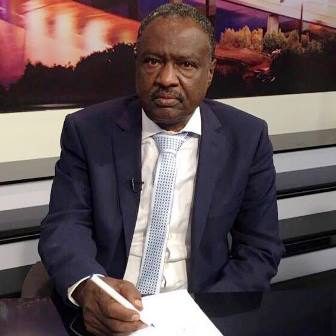The Heroism of the Leaders

By: Rashid Abdulrahim
In July 1983, the Sudanese Armed Forces and the Sudanese Air Force recorded one of the most heroic aerial feats in the history of world wars, when they freed several Western hostages who had been captured by the insurgents in the stronghold of Mount Boma in Southern Sudan. The air assault was led by Major Issam al-Din Mirghani, with Captain Kamal Youssef commanding the assault force.
In January 1988, Colonel Martyr Mukhtar Mohamedin’s plane crashed in the Nasser area after completing nine scheduled sorties. He managed to rescue the force that had been surrounded by the rebels.
In one of the heroic tales of commanders, the aircraft of the Operations Commander, Major General Abu Qurun, was monitoring the martyr Mukhtar’s operation from the air.
The aircraft was severely under-equipped, but Martyr Mukhtar responded to the command, not as an order, from the brave leader, Lieutenant General Mahdi Babou Nimer, to lead the individual mission to rescue his besieged comrades.
In those days, fraught with danger and shortages in equipment, the plane of the Minister of Defense, Abdel Majid Hamid Khalil, was flying over the battlefields of Southern Sudan, where it was hit, yet the brave minister survived.
A fire broke out in the aircraft in Heglig, but the Minister of State for Defense, Ibrahim Shams El Din, refused to exit before others, and he was martyred with his soldiers.
When the plane in Nasser crashed, Major General Al-Zubeir was among those who did not leave, but instead, he achieved martyrdom along with a group of commanders, including Brigadier General Arok Ton Arok.
Recently, the heroism of commanders repeated itself as they led from the front and attained martyrdom in the skies over Nyala, including Major General Pilot Abu al-Qasim Ali and several of his officers.
Yesterday, they were joined by the brave and pious hero, the Hafiz of the Quran with many narrations, expert in his military work and beloved by all who knew him—Major General Bahr Ahmed Bahr. His name will forever be written in the record of heroes, showing that leaders in our country are the ones who lead from the front in times of danger and hardship.
Martyr Major General Pilot Abu al-Qasim Ali wrote a shining page of heroism in this war. Despite the injustice he faced, being imprisoned without cause and dismissed from service, he, like many of his brothers, advanced and surrendered himself to the leadership, volunteering to participate in the war, not asking for the rank, salary, or privileges he deserved.
In our current war, amidst the dust of battle in the skies, the plane of the Commander-in-Chief, General Abdel Fattah al-Burhan, lands after every battle to join his troops, receiving battle reports firsthand, not through papers.
Generals, like General Kabashi and General Yasser al-Atta, also write similar heroic feats of bravery, leading from the front, not from offices or through reports.
They all work as soldiers and commanders in circumstances of shortages and lack of resources, fighting in a war of treachery.
They do not complain, they do not wait for the completion of resources, nor do shortages hinder their work to protect and preserve their country, their people, and their citizens.
The great victories of our Armed Forces have been recorded by these commanders and the soldiers they trained, working with them. They are not interested in personal gain or advantage but instead offer themselves, their country, and their people.
(Quoted from “Al-Muhaqqiq”)



